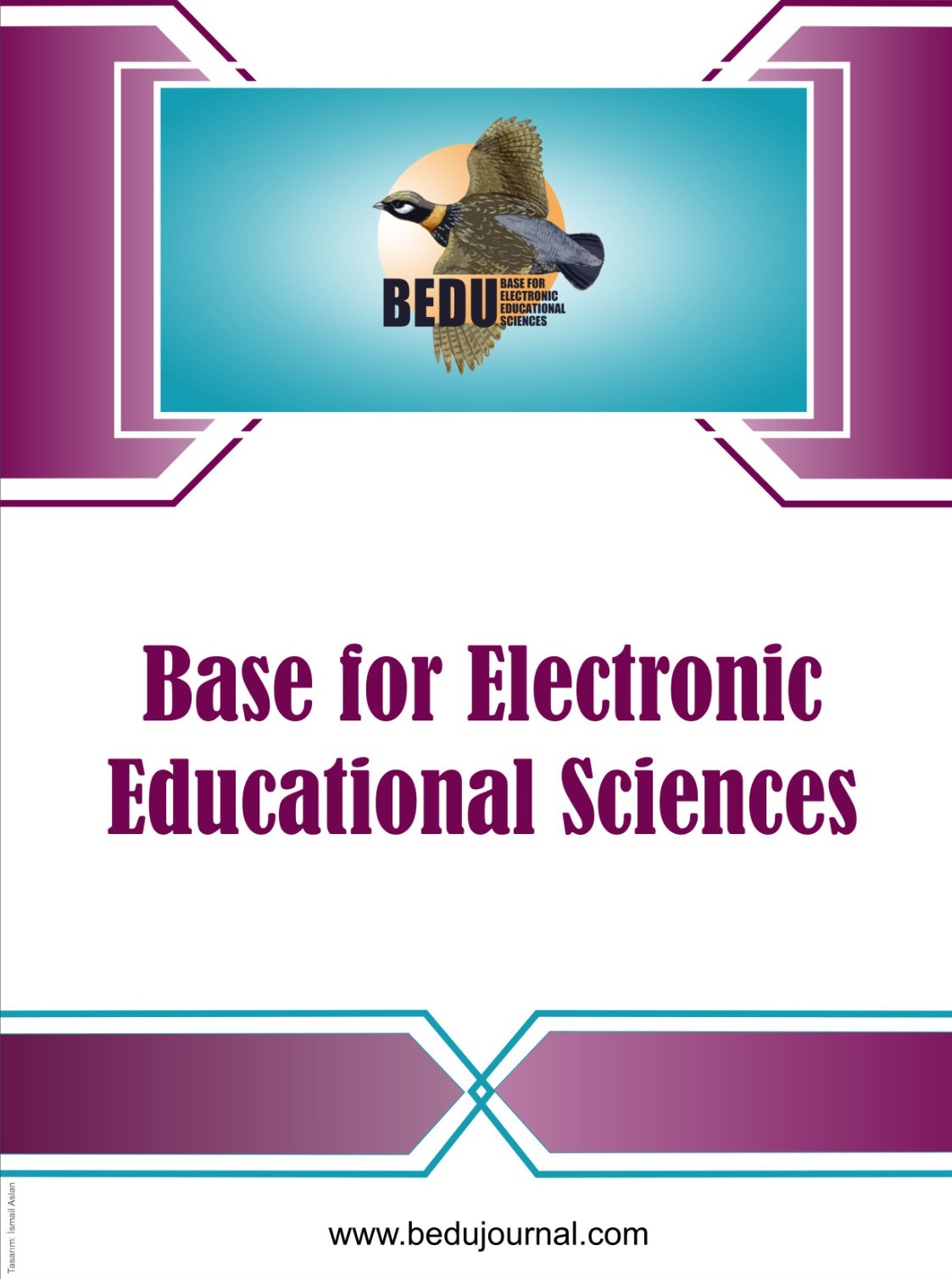Research article | Open Access
Base for Electronic Educational Sciences 2022, Vol. 3(2) 22-31
An Analysis of Preservice Geography Teachers' Scientific Research Self-Efficacy
pp. 22 - 31 | DOI: https://doi.org/10.29329/bedu.2022.471.3
Publish Date: September 30, 2022 | Single/Total View: 109/750 | Single/Total Download: 157/1.329
Abstract
The purpose of the study is to examine the scientific research self-efficacy of geography teacher candidates of COMU Faculty of Education. In this direction, a scientific research self-efficacy scale consisting of six factors and 37 items was used. The sample group of the study was the teacher candidates who continue their educations in the Department of Geography Education, Turkish and Social Sciences Education, a Faculty of Education at a state university in Marmara region of Turkey. The sample of the research consists of 72 teacher candidates who continue their education in the same department (1,2,3 and 4th grades). As a result of the study, it was found that male Geography Teacher candidates' opinions on scientific self-efficacy were more positive than female Geography Teacher candidates. As a result of the research, after determining the problem, it was determined that they had a high self-efficacy that they could continue the investigation accordingly, but that their self-efficacy was low at the point of identifying the problem situation personally. It has been determined that while the candidates have high self-efficacy in examining the literature in the context of the problem situation, they have low self-efficacy in accessing national and international databases for literature review. It has been observed that the geography teacher candidates have high self-efficacy in determining the appropriate method for testing hypotheses, and they have low self-efficacy if they can perform validity and reliability studies of the data collection tools they will use in the research. It has been observed that they have high self-efficacy in discussing and presenting the study findings to the reader in the reporting process, and low self-efficacy in writing the reporting process according to the testing of the hypothesis(s).
Keywords: Geography Education, scientific research, self-efficacy, reporting, data analysis, method, hypothesis, defining the problem.
APA 7th edition
Oztura, E. (2022). An Analysis of Preservice Geography Teachers’ Scientific Research Self-Efficacy. Base for Electronic Educational Sciences, 3(2), 22-31. https://doi.org/10.29329/bedu.2022.471.3
Harvard
Oztura, E. (2022). An Analysis of Preservice Geography Teachers’ Scientific Research Self-Efficacy. Base for Electronic Educational Sciences, 3(2), pp. 22-31.
Chicago 16th edition
Oztura, Erdal (2022). "An Analysis of Preservice Geography Teachers’ Scientific Research Self-Efficacy". Base for Electronic Educational Sciences 3 (2):22-31. https://doi.org/10.29329/bedu.2022.471.3
Akçöltekin, A. (2019). Pedagojik formasyon eğitimi alan üniversite öğrencilerinin bilimsel araştırma basamaklarına yönelik öz yeterliliklerinin incelenmesi. Karadeniz Uluslararası Bilimsel Dergi, (44), 290-301. DOI: 10.17498/kdeniz.644338 0-301.
Akçöltekin, A. (2019). Bilimsel araştırmalara yönelik öğretmen öz yeterlilik ölçeğinin geliştirilmesi. Kastamonu Eğitim Dergisi, 27 (6), 2713-2727. DOI: 10.24106/kefdergi.3707.
Bandura, A. (1977). Social learning theory. New Jersey: PrenticeHall.
Bandura, A. (1986). Social foundations of thought and action: A social cognitive theory. NJ: Prentice Hall, Inc.
Bowtell, E. (1996). Educational stereotyping: Children’s perceptions of scientists: 1990’s style. Investigating: Australian Primary and Junior Science Journal, 12 (1), 104- 108.
Dilekmen, M. ve Ada, Ş. (2010). Öğrenmede güdülenme. Atatürk Üniversitesi Kazım Karabekir Eğitim Fakültesi Dergisi, (11) , 113-123.
Geban, Ö. (1990). Effects of two different ınstructional treatments on the students' chemistry achievement, science process skills and attitude towards chemistry at the high school level. Yayınlanmamış Doktora Tezi. Middle East Technical University, Ankara.
Godson, I. (1994). Studying teacher’s life and work. Teaching and Teachers Education, 10(1), 29-37.
Gündoğdu, M. (2001). Üniversite öğrencilerinin bilimsel düşünme becerilerinin yordanmasi. Yayınlanmamış Doktora Tezi. Hacettepe Üniversitesi, Sosyal Bilimler Enstitüsü, Ankara.
Kotaman, H. (2008). Özyeterlilik inancı ve öğrenme performansının geliştirilmesine ilişkin yazın taraması. Uludağ Üniversitesi Eğitim Fakültesi Dergisi XXI(1), 111-133.
İnam, A. (2003). Teknoloji-bilim ilişkisinin insan yaşamındaki yeri, http://www.phil.metu.edu.tr/ahmet-inam/teknoloji.htm (Erişim Tarihi: 12.02. 2011).
Karasar, N. (1999). Bilimsel Araştırma Yöntemi, 9. Basım. Ankara: Nobel Yayın Dağıtım.
Oral B. ve Çoban A.(2020). Kuramdan Uygulamaya Eğitimde Bilimsel Araştırma Yöntemleri. Ankara: Pegem Akademi Yayıncılık.
Saracaloğlu, S. (2008). Lisansüstü öğrencilerin akademik güdülenme düzeyleri, araştırma kaygıları ve tutumları ile araştırma yeterlilikleri arasındaki ilişki. Yüzüncü Yıl Üniversitesi Eğitim Fakültesi Dergisi, 2(5), 179-208.
Stuessy, C. (1984). Correlates of scientific reasoning in adolescents: Experience, locus of control, age, field, dependence-independence, Rigidity/Fkexibility, IQ and Gender.
Stuessy, C. (1984). Correlates of scientific reasoning in adolescents: Experience, locus of control, age, field, dependence- ındependence, rigidity/flexibility, ıq and gender. Unpublished Doctoral Dissertation. Ohio: The Ohio State University, Colombus.
Taşdemir M. ve Taşdemir A. (2011). Öğretmen Adaylarının Bilimsel Araştırmaları İnceleme Yeterlikleri. Selçuk Üniversitesi Sosyal Bilimler Enstitüsü Dergisi, 26, 343-353.
Tavşancıl, E., Erdem, D., Yalçın, N., Yıldırım, Ö. ve Bilican, S. (2010). Examination of data analyses used for master’s theses in educational sciences. Procedia Social and Behavioral Sciences, 9, 1467-1474.
Thebaud, S. (1978). Bilimsel ve Teknik Araştırma “Dizgeleri” (Kalkınmakta Olan Ülkelerde). (Çev. Aytaç Açıkalın), Ankara Üniversitesi Eğitim Fakültesi Dergisi, 11 (1), 243-259. DOI: 10.1501/Egifak_0000000546.
